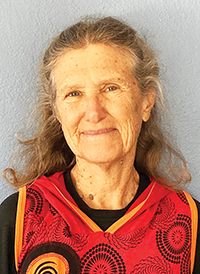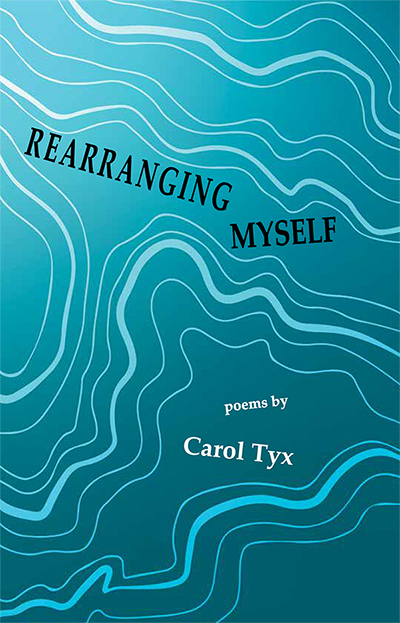Rearranging Myself
poems by
Carol Tyx
40 pages, $13 (+ shipping)
ISBN: 978-1-59948-979-7
Release Date: November 28, 2023
The Advance Sale Discount price on this title has expired. Those who prefer to pay by check, the price is $17/book (which includes shipping & sales tax) and should be sent to: Main Street Rag, 4416 Shea Lane, Mint Hill, NC 28227.
 Carol Tyx lives in Iowa City, where she raises her voice in the community sing movement, sponsors a refugee family, and supports community-based agriculture. A professor emeritus at Mt. Mercy University, Tyx is the winner of a Willow Run Poetry Award for Remaking Achilles: Slicing into Angola’s History. Her recent work has appeared in Poetry East, Big Muddy, and Caesura. She likes to wander in old cemeteries and prairies, and makes a phenomenal rhubarb raspberry pie.
Carol Tyx lives in Iowa City, where she raises her voice in the community sing movement, sponsors a refugee family, and supports community-based agriculture. A professor emeritus at Mt. Mercy University, Tyx is the winner of a Willow Run Poetry Award for Remaking Achilles: Slicing into Angola’s History. Her recent work has appeared in Poetry East, Big Muddy, and Caesura. She likes to wander in old cemeteries and prairies, and makes a phenomenal rhubarb raspberry pie.
The poems of Carol Tyx accumulate like a summer storm cloud—”everything extending wider and deeper,” as the speaker is rearranged by memories that “wait to carry her back to some other self.” Stir in the stories of others—a grandmother in Gaza, a former lover, that certain student, dogs and cats and deer—until we “split open and start over in some other world.” ~Cecile Goding, Iowa Summer Writing Festival
In this big-hearted portrait of her life from seventeen to seventy, Carol Tyx celebrates the transformative potential of single moments. Each poem—each look at love, loss, or joy—immerses you in her ferocious and tender awareness, inviting you to refresh and rearrange yourself. ~Mary Vermillion
These are powerful poems that expose the emotional tentacles tying us to our past and present selves. Here, the language is intimate and visceral, sensuous, and wise, each poem offering the reality of unbearable knowing as well as the promise of unexpected tenderness. Rearranging Myself is the work of a poet who opens the door to that complicated organ: the heart. ~Patricia Foster (Written in the Sky: Lessons of a Southern Daughter)
The Summer She Turned Seventeen
On land she was driven into
the bodies of boys as if
pressing against them was
the only way to convince herself
she had a body, but in the water
it was different, starting the night
she broke the rules, slipping
to the lake at midnight
where she swam out further
than anyone else and floated
in the dark by herself,
held by water and stars so brilliant
they shattered her need
to be desired.
She felt herself dissolving
and at the same time
steadier than she had ever
been before,
the night compacting
a solid core
even as it spread her
on its surface.
Cold
He huddles on his girlfriend’s couch—this woman
who’s been seasoned by North Dakota—
and knows what she will do if he asks her
to turn up the heat—swaddle him
in afghans, a wool poncho;
offer sweaters, wool socks.
He doesn’t know why he can’t tell her—
at least not yet—how these layers
can’t insulate him from this cold
that floods him so fast he might
drown in it, how it freezes him
from the inside out, sends tentacles
of ice down his fingers, how all winter
he huddled with his brothers while cold
punched the farmhouse windows,
pressed against the thin walls, threatened
to choke him as he watched his father
beat his mother then disappear, leaving
only cold pushing against the slammed door,
while he and his brothers froze
under the blankets, afraid to move,
the weight of zero circling them.
The Student I Failed in Writing and Life Stories
He disappeared, the last paper never showing up,
claimed by some other world, like his first essay
where his mother left what he said was like a cult.
After reading the opening I thought the story might
take a heroic turn—we escaped, yanked ourselves
into freedom—but he understood the narrative as exile—
he had already been free, careening across the valley
on horseback, a multitude of brothers and sisters galloping
beside him, jumping off to Sunday dinners prepared by
multiple mothers, mountains of mashed potatoes
fields of corn, rivers of pie.
He had hair like thatch and the feel of wind
as if he had been blown to class. This world—
classrooms without windows, the press of assignments—
was the captivity—no horses, no sun-drenched afternoons,
a place where he was related to no one, a solitary self
or no self, losing himself in fantasy worlds of video games
or drugs, his head crashing onto his desk and no matter
how many times I called his name, I could not find him
until finally he flung himself into the wind,
his story blown beyond what I could see.


 Carol Tyx lives in Iowa City, where she raises her voice in the community sing movement, sponsors a refugee family, and supports community-based agriculture. A professor emeritus at Mt. Mercy University, Tyx is the winner of a Willow Run Poetry Award for Remaking Achilles: Slicing into Angola’s History. Her recent work has appeared in Poetry East, Big Muddy, and Caesura. She likes to wander in old cemeteries and prairies, and makes a phenomenal rhubarb raspberry pie.
Carol Tyx lives in Iowa City, where she raises her voice in the community sing movement, sponsors a refugee family, and supports community-based agriculture. A professor emeritus at Mt. Mercy University, Tyx is the winner of a Willow Run Poetry Award for Remaking Achilles: Slicing into Angola’s History. Her recent work has appeared in Poetry East, Big Muddy, and Caesura. She likes to wander in old cemeteries and prairies, and makes a phenomenal rhubarb raspberry pie.